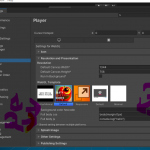Introduction:
When developing a server-side solution for tracking players in a multi-room game environment, the choice between using a database or a text file is crucial. In this article, we'll explore the benefits of a relational database and provide a practical SQL example for creating a database to manage multiple rooms, each keeping track of playing and idle players.
SQL Database Creation Script:
-- Create a Database
CREATE DATABASE IF NOT EXISTS GameManagement;-- Use the Database
USE GameManagement;-- Create a Table for Rooms
CREATE TABLE IF NOT EXISTS Rooms (
RoomID INT PRIMARY KEY,
RoomName VARCHAR(255) NOT NULL
);-- Create a Table for Players
CREATE TABLE IF NOT EXISTS Players (
PlayerID INT PRIMARY KEY,
PlayerName VARCHAR(255) NOT NULL,
RoomID INT,
Status ENUM('Playing', 'Idle') DEFAULT 'Idle',
FOREIGN KEY (RoomID) REFERENCES Rooms(RoomID)
);
Speed of manipulating a text file versus a database in PHP:
The speed of manipulating a text file versus a database in PHP can depend on various factors, and it's not a straightforward comparison. Let's break down the considerations:
- File System vs. Database:
- Text File: Reading and writing to a local text file can be faster in terms of raw I/O operations compared to a database, especially if the file is small and simple.
- Database: Databases, on the other hand, are designed for efficient data retrieval and manipulation. They can handle complex queries, indexing, and relationships, which can be beneficial for more advanced data operations.
- Size and Complexity of Data:
- Text File: For small datasets or simple data structures, manipulating a text file may be faster. However, as the size and complexity of the data grow, databases become more advantageous, as they are optimized for managing large datasets and complex relationships.
- Concurrency and Simultaneous Access:
- Text File: Text files are typically not designed for simultaneous access by multiple users. If your application requires concurrent access to the data by multiple users, a database with proper locking mechanisms can handle this more effectively.
- Database: Databases are designed to handle concurrent access and can provide better support for transactions and data integrity in multi-user scenarios.
- Network Overhead:
- Text File: Manipulating a local text file involves minimal network overhead.
- Database: If the database is on a remote server, network latency can impact performance. However, local databases or well-optimized network configurations can mitigate this.
- Maintenance and Scalability:
- Text File: Maintenance and scalability can become challenging as the application grows, especially if you need to implement features like data indexing, relationships, or data validation.
- Database: Databases provide better scalability and maintenance options. They can handle growing amounts of data, and modern databases offer features like replication and sharding for scalability.
In summary, for simple tasks or small datasets, manipulating a local text file may be faster. However, as your application grows in complexity and size, using a database becomes a more scalable and efficient solution, especially when dealing with multiple users and complex data structures. Consider the specific requirements and constraints of your project to make an informed decision.











